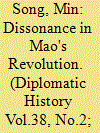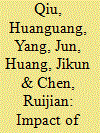| Srl | Item |
| 1 |
ID:
132023


|
|
|
|
|
| Publication |
2014.
|
| Summary/Abstract |
Following President Richard Nixon's visit to China in February 1972, U.S.-China trade increased almost ten-fold within three years, of which China's agricultural imports represented the largest category. This trade created unprecedented opportunities for the Chinese pragmatists to pursue economic modernization, and sharpened the conflict between them and the radicals who adhered to Mao Zedong's ideological crusade. Drawing on both English and Chinese sources, this article examines the fluctuations of China-U.S. agricultural trade between 1972 and 1978. It focuses on the process of trade management in an ideologically charged environment, specifically, the interactions between the pragmatists and radicals under the dominance of Mao. It argues that this trade brought tremendous pressure on the very framework of that Chinese system, tested the boundaries of Mao's revolutionary ideology, and encouraged a fundamental change of course in China.
|
|
|
|
|
|
|
|
|
|
|
|
|
|
|
|
| 2 |
ID:
079064


|
|
|
|
|
| Publication |
2007.
|
| Summary/Abstract |
This study aims to examine the impact of the China-ASEAN Free Trade Area (CAFTA) on China's international agricultural trade and its regional agricultural development, using the Global Trade Analysis Project model and the China Agricultural Decision Support System. Our analysis showed that: (i) CAFTA will improve resource allocation efficiencies for both China and ASEAN and will promote bilateral agricultural trade and, hence, will have positive effects on the economic development of both sides; (ii) CAFTA will accelerate China's export of the agricultural commodities in which it has comparative advantages, such as vegetables, wheat and horticultural products, but at the same time bring about a large increase in imports of commodities such as vegetable oil and sugar; and (iii) CAFTA will have significantly varying impacts on China's regional agricultural development because of large differences in the agricultural production structure in each region. Our results indicate that agriculture in the northern, northeastern and eastern regions of China will benefit from CAFTA, whereas agriculture development in southern China will suffer. Those regional specific impacts are quite different from the effects brought by multilateral free trade treaties, such as those of the WTO, which usually have positive effects on south China but negative impacts on the northern and western parts of China
|
|
|
|
|
|
|
|
|
|
|
|
|
|
|
|